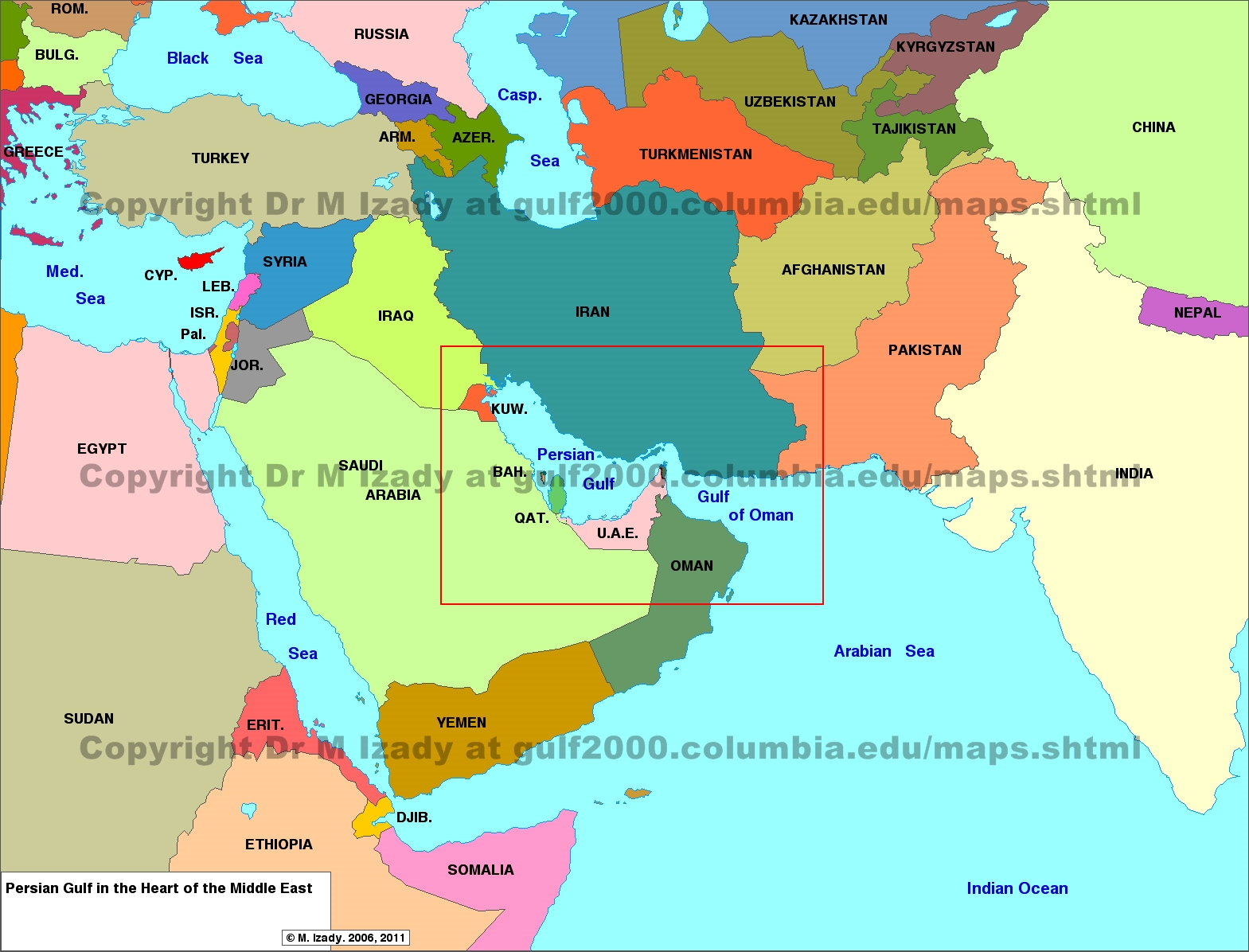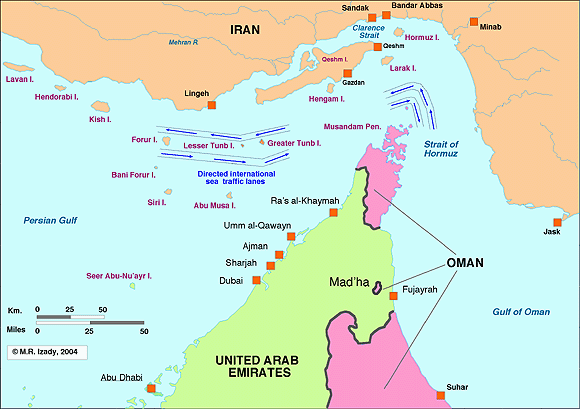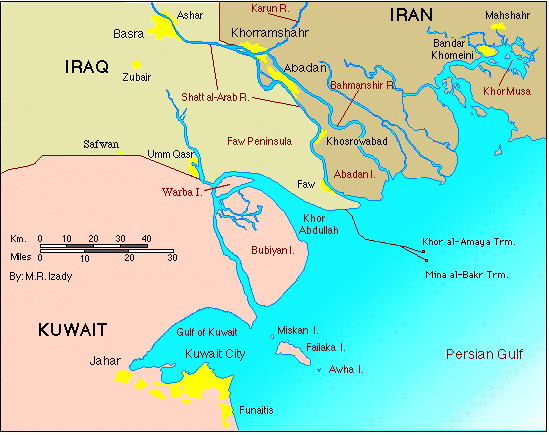Si tecleas Persian Gulf o Golfo Pérsico GoogleMaps te lleva exactamente al mismo sitio que si tecleas Arabic Gulf o Golfo Arábigo.
Aunque comparten golfo y son mayoritariamente musulmanes, a la derecha son chiíes y a la izquierda sunitas, aquéllos persas y estos árabes... y sus intereses son muy, muy diferentes.
Michael J. Totten entrevistó a Martin Kramer en septiembre de 2010 sobre la bomba iraní y, como era de esperar, MK nos sorprende a todos con un análisis agudísimo y diferente.
El entrevistador presenta así al entrevistado:
"I sought out Martin Kramer in Jerusalem because I knew he would give me an analysis well outside-the-box on Iran's nuclear weapons. He's a scholar, not a politician or pundit, and he doesn't conveniently fit into anyone's ideological box. I wasn't disappointed, and I don't think you will be either. What he has to say is different from anything you've read from anyone in the media, including me."
MK viene a sostener que el objetivo a largo plazo de Irán y su bomba nuclear es dominar el Golfo que ellos llaman Pérsico, y no el Levante, para, sobre todo, influir más intensamente en la disponibilidad del petróleo. esto es, en su precio, claro.
Es tan listo MK que más vale leer todo lo que tiene que decir, sin olvidar lo listo que es (aunque algo es seguro: su objetivo siempre es defender Israel). Una gota:
Es tan listo MK que más vale leer todo lo que tiene que decir, sin olvidar lo listo que es (aunque algo es seguro: su objetivo siempre es defender Israel). Una gota:
"And this creates a dynamic where if Iran also has nuclear weapons they will increasingly hedge. Things they allow Americans now—such as basing rights for operations in the Persian Gulf and beyond—will become more and more difficult to negotiate if Iran opposes them. So we would see an erosion of the American position in the Persian Gulf.
I think Iran is a lot less interested in justice for the Palestinians than in establishing their command over the gulf they call Persian.
(...)
The Gulf is always very much a resource game."
En la misma línea, Daniel Pipes cita aquí a los personajes americanos que apoyan su "bomb Iran" idea: que Barack Obama puede servir al país (EEUU) y a su decaída presidencia si elimina las instalaciones nucleares iraníes.
Sobre el tema de la bomba, otro artículo, Academic head warns against airstrike on Iranian nukes (Yaakov Lappin, 16 Sep 2010), que presenta lo que Uriel Reichman, presidente del Interdisciplinary Center (IDC) Herzliya, dijo en la Tenth International Conference on Terrorism's Global Impact, organizada por el International Institute for Counter-Terrorism. Kramer lo ha calificado de provocador.
Sobre el tema de la bomba, otro artículo, Academic head warns against airstrike on Iranian nukes (Yaakov Lappin, 16 Sep 2010), que presenta lo que Uriel Reichman, presidente del Interdisciplinary Center (IDC) Herzliya, dijo en la Tenth International Conference on Terrorism's Global Impact, organizada por el International Institute for Counter-Terrorism. Kramer lo ha calificado de provocador.
Por si no lo tienes claro, en el mapa de abajo: a la derecha Irán, a la izquierda Arabia Saudí; Israel tirando al noroeste.
Los planos son del Gulf 2000 Project de la Universidad de Columbia (NY).
PD Siguiendo con el tema, Kramer se hace eco, el 19 nov en su facebook, del editorial del WaPo del día anterior que refiere la posición del Secretario de Defensa useño al respecto, y reitera la pregunta que se hacen en el Post, ¿por qué dice lo que dice el señor Secretario?:
WaPo editorial: "Obama's mantra about Iran has been that 'all options are on the table'—meaning he will not rule out military action to stop its attempt to acquire nuclear weapons... So why does Defense Secretary Gates keep undercutting the message? Twice in the past week, Gates has publicly argued against a military option—even though neither the US nor Israel appears to be close to launching a strike." Why?
PPD Otro artículo que sustenta la idea básica de Kramer: The Gulf States in the Shadow of Iran: Iranian Ambitions, de Patrick Knapp (en MEF, Middle East Quarterly, Winter 2010), alférez en la Guardia Nacional del Ejército de Minnesota Army National Guard, que actualmente hace el Curso Básico de Oficiales de la Inteligencia Militar; empieza así:
"The Obama administration is caught on the horns of a dilemma. On the one hand, it has welcomed the Gulf Security Dialogue (GSD) as a chance to further "mutual interests" with Persian Gulf states, but, on the other, it has sought pragmatic engagement with the Islamic Republic—the greatest threat to gulf security."
PPPD El 28 nov 2010 wikileaks difunde anundante info secreta. El NYT ha abierto una sección con los documentos relativos a Irán y su programa nuclear, desvelando las fuertes presiones de los países árabes por detenerlo, y la opinión del Secretario de Defensa Robert Gates de que aun si se hiciera eso solo retrasaría el programa 2-3 años. Here is the report of June 2, 2010, on Barak's statements to two US Congress and Senate delegations.
Los planos son del Gulf 2000 Project de la Universidad de Columbia (NY).





